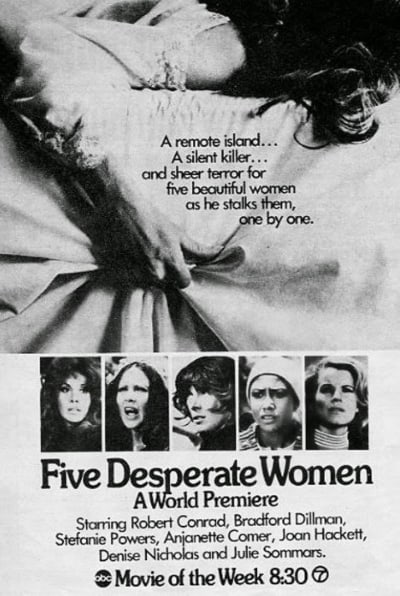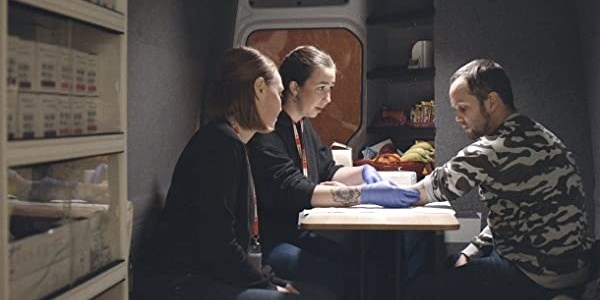‘Five Desperate Women’ Find Fun, Sun, and Murder
Welcome to 4:3 & Forgotten — a weekly column in which Kieran Fisher and I get to look back at TV terrors that scared adults (and the kids they let watch) across the limited airwaves of the ’70s. This week we head to a remote island alongside celebration, murder, and Five Desperate Women.
Aaron Spelling was always best known as the producer behind numerous hit television shows including the likes of Fantasy Island, T.J. Hooker, Beverly Hills 90210, Charmed, and more. For our purposes, though, it’s his TV movies we’re most interested in. More specifically, it’s his 70s TV genre efforts like Cruise Into Terror, Death Sentence, A Cold Night’s Death, and others that we remember most. This week we’re checking out another one of his death-riddled productions concerning old friends reuniting for a weekend of murder.
Where: ABC
When: September 28th, 1971
The first thing we see in Five Desperate Women (1971) is an even more desperate man. A patient escapes from an asylum, his face constantly hidden by blocking and shadows, before killing a stranger on a nearby beach — and stealing the man’s Sunset Isle jacket. The music and camera zoom tell us this is important and ominous!
The five women come next as they meet at a coastal dock for a weekend reunion years after graduating together from college. Gloria (Stefanie Powers), Mary (Julie Sommars), Dorian (Joan Hackett), Lucy (Anjanette Comer), and Joy (Denise Nicholas) have gone their separate ways with differing results, but they’re determined to have fun on this remote island. One of two men, though, stand in their way. Jim (Bradford Dillman) is the boat captain, new at his job and more than a little horny for the ladies. Michael (Robert Conrad) is the tanned, relaxed caretaker who tells Jim to leave the customers alone.

Five Desperate Women takes an interesting tack with what could easily have been a familiar tale. We know one of the two men is the killer — already entertaining as the idea of Conrad and Dillman being physical equals is funny stuff — but once the first body hits the floor it becomes a guessing game. The four remaining women hole up in the house and debate which of the guys could be the murderer, and the two men do the same.
Viewers will lean towards Jim being the murderer in part because the character is something of an unlikable powder keg. Of course, the film could be overplaying its hand there as a misdirect meaning Michael is the bad guy. It’s a mystery, and both the editing and camera-work go out of their way to keep it one until the big reveal. That said, some quick glimpses suggest the asylum inmate and killer are actually a stand-in performer…
The script comes courtesy of Walter Black and Marc Norman, the latter of whom went on to co-write Cutthroat Island (1995) and Shakespeare in Love (1998), and it milks that central mystery for all it’s worth. That debate takes up almost as much screen time as the insults, drama, and cattiness between the women. There’s fun to be had there too thanks to some memorable dialogue — “This wouldn’t have happened if you hadn’t been such a bottle baby,” says Gloria to Lucy the “lush” — but the script loses steam in the third act. The talk and mystery leave no room for more killings, so rather than become an And Then There Were None-type situation we’re left to settle for two measly murders. (Three if you count the dog.)
At seventy-three minutes, though, the lack of deaths doesn’t quite hurt the pacing in Five Desperate Women. It doesn’t help it either, but unsung film and TV veteran Ted Post (Hang ‘Em High, 1968; The Baby, 1973) directs with energy and a little bit of style including a brief stint with the killer’s POV. We feel the claustrophobia inside the house, and fights are choreographed with plenty of movement and action. He can’t quite help the final minutes as things come to an uninspired conclusion, but it’s never dull.
Five Desperate Women teases the slightest of elements more associated with a slasher than with a mystery, but it’s the latter that the film embraces. It’s a murder mystery with a single murder (seeing as the second occurs while revealing the killer’s identity). The film would probably be better regarded had it gone out with a bang or a higher body count, but as it stands it’s a perfectly adequate TV movie which is more than some manage to deliver.
Turn the dial (okay fine just click here) for more 4:3 & Forgotten.





